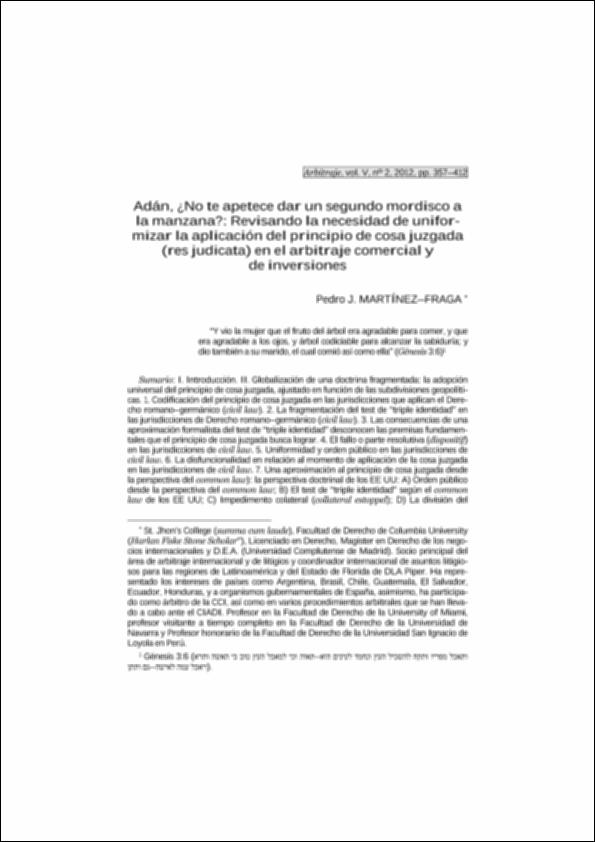Please use this identifier to cite or link to this item:
http://hdl.handle.net/10637/13074Adán, ¿no te apetece dar un segundo mordisco a la manzana? : revisando la necesidad de uniformizar la aplicación del principio de cosa juzgada (res judicata) en el arbitraje comercial y de inversiones.
| Title: | Adán, ¿no te apetece dar un segundo mordisco a la manzana? : revisando la necesidad de uniformizar la aplicación del principio de cosa juzgada (res judicata) en el arbitraje comercial y de inversiones. |
| Authors : | Martínez-Fraga, Pedro J. |
| Keywords: | Derecho Procesal Civil Internacional.; Principio de cosa juzgada.; Arbitraje comercial.; Arbitraje de inversiones.; Efecto de cosa sobre futuros procedimientos arbitrales.; International Civil Procedural Law.; Res Judicata.; Common Law.; Civil Law.; Commercial Commercial Arbitration.; Investment Arbitration.; Res Judicata and Future Arbitral Proceedings. |
| Abstract: | Los tribunales arbitrales no se encuentran obligados a aplicar el principio de cosa
juzgada en la misma extensión en que lo hacen los tribunales judiciales. Por consiguiente el ámbito de aplicación de este principio sobre los laudos arbitrales puede ser
separado completamente de la configuración (y aplicación) que realizan hacen los
jueces y tribunales judiciales estatales cuando pronuncian una sentencia y ello sin
dejar de considerar la singular característica del arbitraje internacional que reposa en
autonomía privada de las partes. El presente estudio persigue un doble un objetivo.
En primer lugar, tras identificar la normativa hegemónica que regula la cuestión de
cosa juzgada tanto en las jurisdicciones que aplican el common law como en las que
aplican el civil law, pretende la realización de una aproximación expansiva y “sustantiva /transaccional”, con la finalidad de identificar la dificultades resultantes de una
aplicación mecánica y formalista de la doctrina de cosa juzgada; que desafían los más
relevantes preceptos de orden público que subyacen a esta doctrina, así como a otros
aspectos del principio de cosa juzgada (collateral estoppel, aplicación de la doctrina
por terceras partes, y causa de acción del estoppel [doctrina de no actuar contra los
actos de preclusión]). Como parte del presente análisis, consideramos que la división
en los pronunciamientos que existe entre los varios Circuitos Judiciales de Apelaciones de los EE UU (Circuit Courts of Appeals) en relación al estándar que debe ser
aplicado cuando surja una cuestión de cosa juzgada como parte de una excepción o
defensa procesal, debe de ser objeto de un análisis profundo. En segundo lugar, se
analiza si la cosa juzgada debe de aplicarse a los arbitrajes inversor–Estado, en función a lo señalado en Saipem S.p.A. v. The People’s Republic of Bangladesh (“Saipem”) y en GEA Group Aktiengesellschaft v. The Republic of Ukraine (“GEA
Group”). Arbitral courts are not bound to apply the principle of res judicata to the same extent as jurisdictional courts do. Therefore the scope of this principle on arbitration awards can be separated completely from the configuration (and application) that judges and state courts do when they make a judgment, notwithstanding the unique feature of international arbitration, which is that it rests on the parties’ private autonomy. This study has a twofold objective. First, after identifying the hegemonic rules governing the issue of res judicata both in common law and civil law jurisdictions, it aims at carrying out an expansive approach and “substantive/transactional” with the purpose of identifying the difficulties resulting from a mechanical and formalistic application of the doctrine of res judicata, that challenge the most important precepts of public policy behind this doctrine, as well as other aspects of the principle of res judicata (collateral estoppel, application of this doctrine by third parties, and cause of action estoppel [doctrine of inaction against acts of estoppel]). As part of this analysis, a thorough analysis must be done concerning the division of pronouncements between the various Judicial Circuit of Appeals in the U.S. (Circuit Courts of Appeals) in relation to the standard to be applied when a question of res judicata arises as part of an exception or procedural defense. Second, it must also be analyzed whether res judicata should apply to investor–State arbitrations, according to the doctrine settled in Saipem SpA v. The People's Republic of Bangladesh (“Saipem”) and in GEA Group Aktiengesellschaft v. The Republic of Ukraine (“GEA Group”). |
| Description: | En: Arbitraje: revista de arbitraje comercial y de inversiones. eISSN. 2603-9281. vol. 5, n. 2, 2012, pp 357-412 |
| URI: | http://hdl.handle.net/10637/13074 |
| Rights : | http://creativecommons.org/licenses/by-nc-nd/4.0/deed.es |
| Issue Date: | 21-Oct-2012 |
| Appears in Collections: | 2012 Arbitraje nº 2 |
Items in DSpace are protected by copyright, with all rights reserved, unless otherwise indicated.


